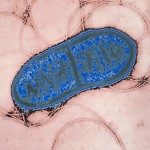Lien vers Pubmed [PMID] – 22901538
Cell Host Microbe 2012 Aug;12(2):177-86
Pathogenic bacterial strains emerge largely due to transfer of virulence and antimicrobial resistance genes between bacteria, a process known as horizontal gene transfer (HGT). Clustered, regularly interspaced, short palindromic repeat (CRISPR) loci of bacteria and archaea encode a sequence-specific defense mechanism against bacteriophages and constitute a programmable barrier to HGT. However, the impact of CRISPRs on the emergence of virulence is unknown. We programmed the human pathogen Streptococcus pneumoniae with CRISPR sequences that target capsule genes, an essential pneumococcal virulence factor, and show that CRISPR interference can prevent transformation of nonencapsulated, avirulent pneumococci into capsulated, virulent strains during infection in mice. Further, at low frequencies bacteria can lose CRISPR function, acquire capsule genes, and mount a successful infection. These results demonstrate that CRISPR interference can prevent the emergence of virulence in vivo and that strong selective pressure for virulence or antibiotic resistance can lead to CRISPR loss in bacterial pathogens.

